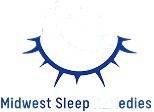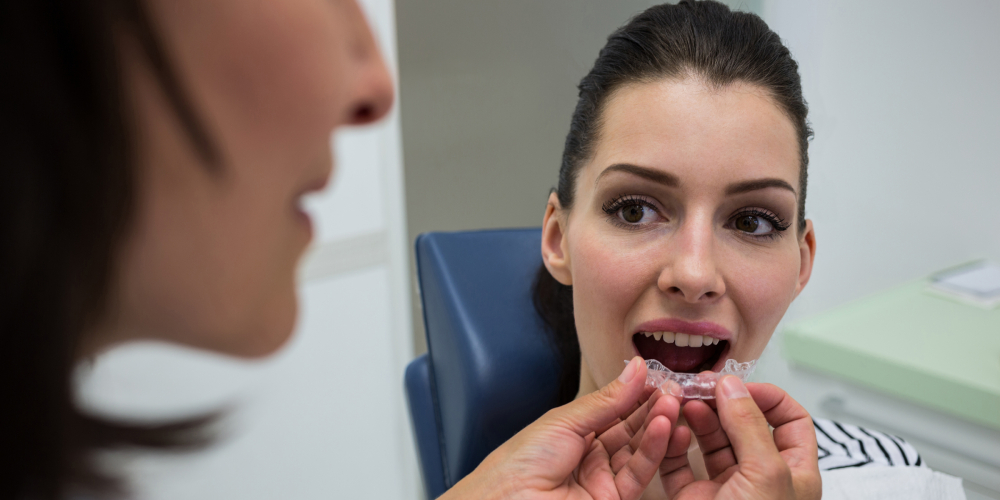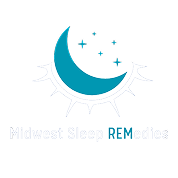Are you searching for a sleep apnea solution that fits seamlessly into your lifestyle? Oral Appliance Therapy (OAT) might be the answer you’ve been looking for. However, recent studies reveal that while both OAT and CPAP improve sleep apnea symptoms, OAT often leads to greater overall satisfaction and a better quality of life.
At Midwest Sleep, we understand the importance of restful nights and energized days. In this blog, we’ll explore how OAT can transform your sleep experience. Moreover, it helps you wake up refreshed, healthier, and ready to embrace life’s moments, without the hassle of bulky equipment.
What Is Oral Appliance Therapy?
Oral appliance therapy is a treatment for obstructive sleep apnea that uses a custom-fitted device, similar to a mouth guard or orthodontic retainer, worn during sleep. Moreover, at Midwest Sleep, we fit these sleep apnea mouth guards to gently move your lower jaw and tongue forward, keeping your airway open throughout the night. As a result, this simple action can significantly reduce snoring and sleep apnea symptoms.
Many people turn to oral appliance therapy because it’s less bulky than CPAP and doesn’t require electricity or tubing. In addition, if you’re looking for a discreet, easy-to-use solution, a sleep apnea mouth guard could be a strong contender. Therefore, understanding the pros and cons of oral appliance for sleep apnea is necessary before making a decision.
Do Sleep Apnea Mouth Guards Work?
You might be wondering, do sleep apnea mouth guards work as well as other treatments? The answer depends on your unique situation; however, here’s what we see at Midwest Sleep and what research shows:
- Oral appliances are highly effective for mild to moderate obstructive sleep apnea.
- Studies report that these devices can improve daytime sleepiness, reduce snoring, and even lower blood pressure, often matching CPAP in these areas.
- For many, comfort and ease of use mean better nightly compliance, which is important for success.
- However, oral appliances may be less effective at reducing breathing pauses and improving blood oxygen levels compared to CPAP, especially in severe cases.
Meanwhile, sleep apnea mouth guard effectiveness is measured by improvements in symptoms and objective data like the apnea-hypopnea index (AHI), which is significantly reduced with consistent use. Therefore, if you’re consistent with nightly use, you’re more likely to see significant benefits. However, the pros and cons of oral appliance for sleep apnea depend on your needs, so let’s look at what makes these devices so appealing.
Why Are Oral Appliances So Popular? (Pros)
At Midwest Sleep, we hear from patients every day about the advantages of oral appliance therapy. However, here’s why so many people choose this option when weighing the pros and cons of oral appliance for sleep apnea:
Comfortable and Custom-Fitted: Each sleep apnea mouth guard is tailored to your mouth, ensuring a snug and comfortable fit, with no bulky masks or straps.
Easy to Use: Slip it in before bed and take it out in the morning. In fact, with no complicated setups or noisy machines.
Portable and Travel-Friendly: Oral appliances are compact and require no electricity, making them perfect for travel or nights away from home.
Quiet: Enjoy a silent night, with no machine noise to disturb you or your partner.
Fewer Side Effects: Many patients experience fewer issues like dry mouth, nasal congestion, or skin irritation compared to CPAP users.
Higher Compliance: Because these devices are comfortable and simple, patients are more likely to use them consistently, which is key for effective treatment.
Insurance Coverage: Oral appliance therapy is often covered by medical insurance, making it accessible for many patients.
Improved Quality of Life: Studies show that both OAT and CPAP improve disease-specific quality of life, but OAT often scores higher in general quality of life surveys.
For example, one of our patients recently shared, “I never thought I’d look forward to bedtime again. My oral appliance is so easy, I forget I’m even wearing it.”
Therefore, with any treatment, there are some potential drawbacks to consider. Moreover, let’s look at the other side.
Looking for a Comfortable Way to Manage Sleep Apnea?
Discover custom oral appliances designed to treat sleep apnea comfortably and effectively.
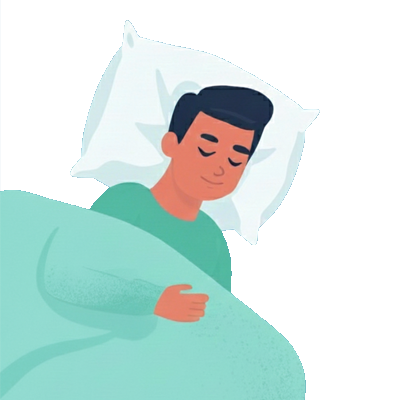
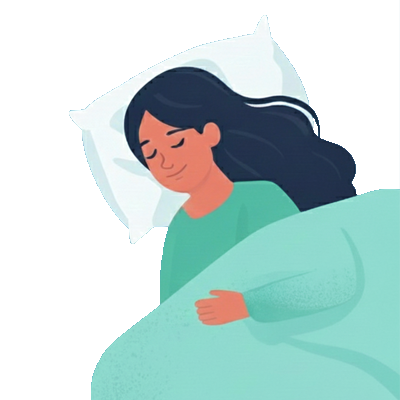


Are There Downsides to Sleep Apnea Mouth Guards? (Cons)
While oral appliance therapy has many benefits, it’s not a perfect fit for everyone. However, here are some things to keep in mind:
Not as Effective for Severe OSA: If you have severe sleep apnea or extremely low blood oxygen levels, CPAP may be a better option for you.
Jaw Discomfort or TMJ Issues: Some users experience jaw soreness, stiffness, or even joint pain, especially during the adjustment period.
Bite Changes and Dental Effects: Over time, you might notice minor changes in your bite or teeth alignment. Therefore, regular dental check-ups are important to monitor these changes.
Initial Side Effects: Increased saliva, dry mouth, or gum tenderness are common at first but usually improve within a few weeks.
Not Suitable for Everyone: If you have certain dental conditions, such as missing teeth, jaw joint problems, or ongoing dental work, an oral appliance may not be recommended.
Ongoing Maintenance: Your device will need regular cleaning and occasional adjustments to stay effective.
Cost Concerns: While insurance often covers oral appliances, out-of-pocket costs can vary, especially if you’re treated outside a medical setting.
On the other hand, we’ve seen a few patients who, despite initial excitement, found the adjustment period challenging. Sometimes, a bit of patience and follow-up with your sleep dentist makes all the difference. Moreover, who’s the best candidate for this therapy?
Is This Treatment Right for You?
Oral appliance therapy is often an excellent choice for individuals with mild to moderate obstructive sleep apnea. Especially, this treatment becomes particularly beneficial for those who cannot tolerate or simply prefer not to use a CPAP machine.
Additionally, if you travel frequently and require a portable solution, oral appliances offer unmatched convenience. Furthermore, many people seek a quieter and less intrusive treatment option, making oral appliance therapy an appealing alternative. In fact, sleep apnea mouth guard effectiveness has been well-documented, providing reliable results for those looking for a comfortable and easy-to-use solution. As a result, this approach provides flexibility and comfort, ensuring that you can manage your sleep apnea effectively while maintaining your lifestyle.
However, this therapy isn’t right for everyone. Those with severe sleep apnea, certain dental issues, or central sleep apnea may need a different approach. Moreover, it’s always best to talk with a sleep specialist or dentist to see if a sleep apnea mouth guard will work for your specific needs. Therefore, let’s see how oral appliances stack up against CPAP.
OAT vs. CPAP, Which One Wins?
Let’s compare oral appliance therapy and CPAP side by side:
| Feature | Oral Appliance Therapy | CPAP |
|---|---|---|
| Comfort | High (custom fit, no mask) | Moderate (mask, straps) |
| Portability | Excellent (small, no power) | Poor (bulky, needs power) |
| Effectiveness | Best for mild/moderate OSA | Best for all OSA severities |
| Side Effects | Fewer (jaw, dental possible) | More (dry mouth, skin issues) |
| Compliance | Higher for many patients | Lower, especially long-term |
| Noise | Silent | Can be noisy |
Additionally, both options improve sleep apnea symptoms. However, your lifestyle and preferences matter. Moreover, some people start with CPAP and later switch to oral appliance therapy for comfort, while others use both together. Therefore, whichever option you choose, here are tips to get the most from your sleep apnea mouth guard.
Getting the Most Out of Your Mouth Guard
We want you to succeed with your oral appliance therapy. Here are our top tips:
- Get Professionally Fitted: A custom device from Midwest Sleep ensures comfort and effectiveness.
- Wear It Consistently: Use your appliance every night for the best results.
- Maintain Good Sleep Habits: Avoid late-night snacking, limit screen time, and keep your bedroom cool for better sleep.
- Clean Regularly: Keep your device clean to prevent dental issues.
- Schedule Follow-Ups: Regular check-ins help us adjust your appliance and monitor your progress.
However, if you ever feel discomfort or notice changes in your bite, let us know right away. Therefore, we’re here to help every step of the way. Moreover, you can see, a little maintenance goes a long way.
Conclusion
At Midwest Sleep, we believe oral appliance therapy is a comfortable and convenient solution for many people with sleep apnea, especially those with mild to moderate cases. Therefore, our custom-fitted devices are easy to use, travel-friendly, and often come with fewer side effects than CPAP. However, while some individuals may notice minor jaw or dental changes, and it may not be right for everyone, we’re here to help you determine the best option.
Moreover, if you’re curious about whether a sleep apnea mouth guard is right for you, our team at Midwest Sleep is ready to guide you through every step of the process.
Have Questions About Disturbed Sleep?
Don’t wait for the symptoms to get worse. Talk to your doctor, get tested, and take the steps toward better sleep and a healthier life.






